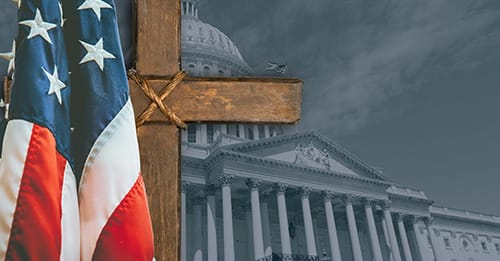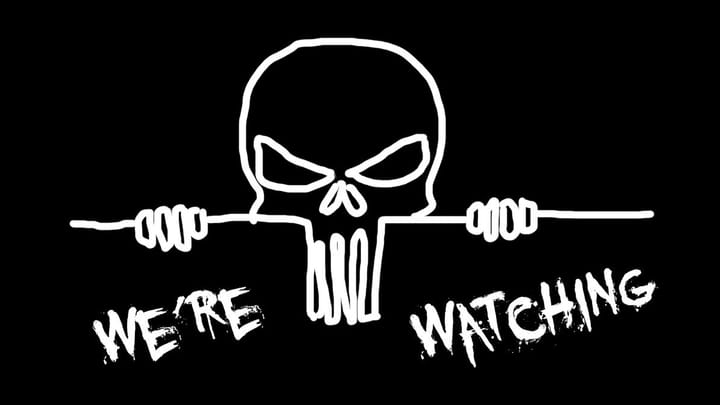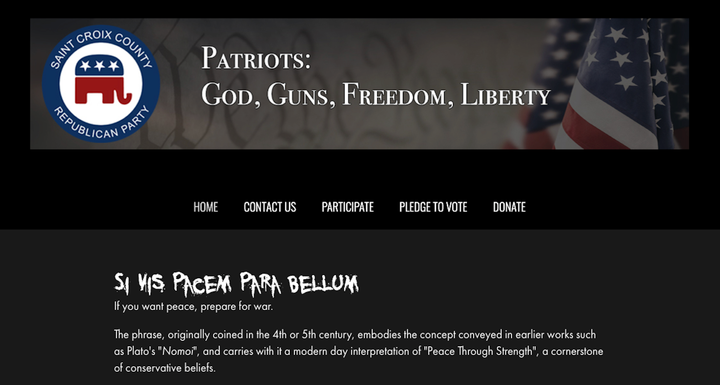Christian Nationalism: What Does that Mean Anyway?
Should a conservative Christian Patriot embrace that label? Let's examine that question.

Recently, I’ve had numerous people mention the term “Christian Nationalist” or “Christian Nationalism”, and ask “Is that a good thing, or should we shy away from that label?” Certainly the left equates the term with racism and bigotry, but so what? Every conservative is seen by a leftist as a racist bigot to the point where those terms have lost all meaning.
So where do we start? Let’s look at the individual component words and their specific meanings. That should shed some light on the combined meaning, right? First, the definition of the term “Christian”. The Oxford Language Dictionary defines it in the following way:
Chris·tian
/ˈkrisCHən/
adjective
relating to or professing Christianity or its teachings.
"the Christian Church"
noun
a person who has received Christian baptism or is a believer in Christianity.
"a born-again Christian"
So far so good. That’s a pretty straight forward, simple definition that is perfectly reasonable in my mind. I certainly believe that definition applies to me.
Na·tion·al·ist
/ˈnaSH(ə)nələst/
noun
a person who strongly identifies with their own nation and vigorously supports its interests, especially to the exclusion or detriment of the interests of other nations.
"he was a staunch nationalist during his 22 years in power"
adjective
relating to nationalists or nationalism.
"a nationalist movement"
OK, yes, that sounds like the typical “America First” patriotic stance where we recognize that it’s the duty of our government to put the interests of the Country’s citizens ahead the interests of citizens of other countries. Not sure that I agree with the “exclusion of detriment of the interests of other nations” clause wording, but OK, if America is first, than other nations need to be second.
What about the term “Nationalism”? Wikipedia defines it in the following way:
“Nationalism is an idea and movement that holds that the nation should be congruent with the state. As a movement, it tends to promote the interests of a particular nation, especially with the aim of gaining and maintaining the nation's sovereignty over its homeland to create a nation-state.”
Well, that’s pretty basic as well, and not at all controversial. Think back to the days immediately following the attack on the World Trade Center on 9/11/2001. The sense of National unity (aka Nationalism) was exceptionally strong at that time, and no one considered it racist. It wasn’t until Trump fostered a conservative awakening during the 2016 election campaign that the term “Nationalism” began being associated by the Left with negative connotations of Racism and White Supremacy.
At this point, regardless of a Leftist interpretation, the phrase “Christian Nationalist”, if understood as the combination of the above definitions above, sounds like a fairly accurate term to describe the many Christian believers who also favor the “America First” approach to government. Right? We’re both Christians, and Nationalists. Doesn’t that mean we should embrace the label of being a “Christian Nationalist” for ourselves? Isn’t the concept of Christian Nationalism something that fundamental, Bible focused, Christian Churches should support? Perhaps not, if the definition of the combination of the two words is actually significantly different than the combined individual definitions of the two individual words. So where did the term originate, anyway?
The concept of “Christian Nationalism / Christian Nationalist” seems to have no distinct point in time in which it originated, but the concept dates at least as far back as “sermons of First Great Awakening1 revivalists who viewed the British war against the French Catholics of the 1750s in cosmic religious terms,”2 and generally refers to the belief that a nation has its own religious identity.
Prolific authors and left leaning activists Andrew Whitehead and Samuel Perry, co-authors of the book Taking America Back for God: Christian Nationalism in the United States (Oxford University Press, 2020), define Christian nationalism this way:
[W]e mean “Christian nationalism” to describe an ideology that idealizes and advocates a fusion of American civil life with a particular type of Christian identity and culture. We use “Christian” here in a specific sense. We are not referring to doctrinal orthodoxy or personal piety. (In fact, we find some Christian nationalists can be quite secular.) Rather, the explicit ideological content of Christian nationalism comprises beliefs about historical identity, cultural preeminence, and political influence. But just as important, it also contains ideological content that is often implicit. This includes symbolic boundaries that conceptually blur and conflate religious identity (Christian, preferably Protestant) with race (white), nativity (born in the United States), citizenship (American), and political ideology (social and fiscal conservative).
Now we’re starting to see the leftist influences on the definition of the term by bringing in the racist and bigoted elements of White Supremacy to the overall concept of “Christian Nationalism”. Nevertheless, a pattern is starting to emerge. The key concept for me hinges on the notion that to a Christian Nationalist, the nation has its own religious identity, and that the nation’s identity is exclusively Christian.
But isn’t this the case? There is a massive amount of documentation and evidence that the founding of our Country has its roots planted firmly in Biblical concepts and that the model for governance is derived extensively from Christian doctrine. Does that mean the founding fathers created a nation with its own distinct Christian identity? In my opinion, absolutely not. In fact, they went out of their way to make sure the government did not establish a national religion in the very first amendment of the Constitution of the United States:
Congress shall make no law respecting an establishment of religion, or prohibiting the free exercise thereof; or abridging the freedom of speech, or of the press; or the right of the people peaceably to assemble, and to petition the Government for a redress of grievances. - First Amendment to the US Constitution
That’s pretty clear. The Nation is not to have its own religious identity. In a 2021 interview, Franklin Graham put it this way:
“Our country is not a Christian country, never has been. We have some Christian principles, but we’re not a Christian country.” - Franklin Graham, ChurchLeaders Podcast March 2021
This is where embracing the label of “Christian Nationalist” really becomes problematic for me. It’s much more than the patriotic notion of the America First philosophy, and puts the focus on the Country as a supreme Nation State with its own identity. That starts to become dangerously close to idolizing the national entity rather than recognizing the sovereignty of the almighty God. So what appears at first glance to be something the Christian Church should embrace, reveals itself to be a great deception on closer examination. It is my opinion that church leadership should avoid associating the church with the concept of Christian Nationalism.
“I think there’s always a need to be concerned [about nationalism]. Whether it’s a problem some think it is, I don’t know. But I think there’s always a problem if people lose sight, especially if Christians lose sight, of what our purpose in life is.” - Franklin Graham, ChurchLeaders Podcast March 2021
There is nothing wrong with an individual sense of patriotism, loyalty to one’s Country, and recognizing American Exceptionalism, as long as it doesn’t cloud our true purpose under God’s plan.
“I hope all of us that live in this country have patriotism, but I do not worship my government. I worship God and his son, Jesus Christ.” - Franklin Graham, ChurchLeaders Podcast March 2021
It all comes down to the fact that our nation is made up of sovereign individuals, joined together by the common bonds defined by the Constitution and Declaration of independence. We’re commissioned to reach individuals, not monolithic nation states.
18 Then Jesus came to them and said, “All authority in heaven and on earth has been given to me. 19 Therefore go and make disciples of all nations, baptizing them in the name of the Father and of the Son and of the Holy Spirit, 20 and teaching them to obey everything I have commanded you. And surely I am with you always, to the very end of the age.” - Matthew 28:18-20
So for me, the choice is a simple one. It’s about building a Nation of Christians, not a Christian Nation.
Thanks for reading. Your feedback is welcomed.
References and Other Resources of Interest
- First Great Awakening - Wikipedia
- Baptizing Uncle Sam: Tracing the Origins of Chritian Nationalism, Reviews in American History Vol. 44, No. 3 (September 2016), pp. 391-399, Johns Hopkins University Press
- Taking Back America for God - Perry / Whitehead
- What Is the Meaning of Christian Nationalism? - Christianity.com
- A Brief History of Christian Nationalism: From the Founders to the Cold War | Barbara O'Brien
- Christian nationalism - Wikipedia
- Christian Nationalism Podcast Series: Should Your Church Be Alarmed? - Podcast Series from CurchLeaders.com
- Who is a Christian Nationalist? - Perry/Whitehead article, George Washington University History News Network Article
- Evangelical Leaders Must Denounce Christian Nationalism — Reverend Rob Schenck
- The Growing Anti-Democratic Threat of Christian Nationalism in the U.S. - Whitehead article in Time Magazine
Is Christian Nationalism True? - Dr. James Emery White Christian Blog - CrossWalk

